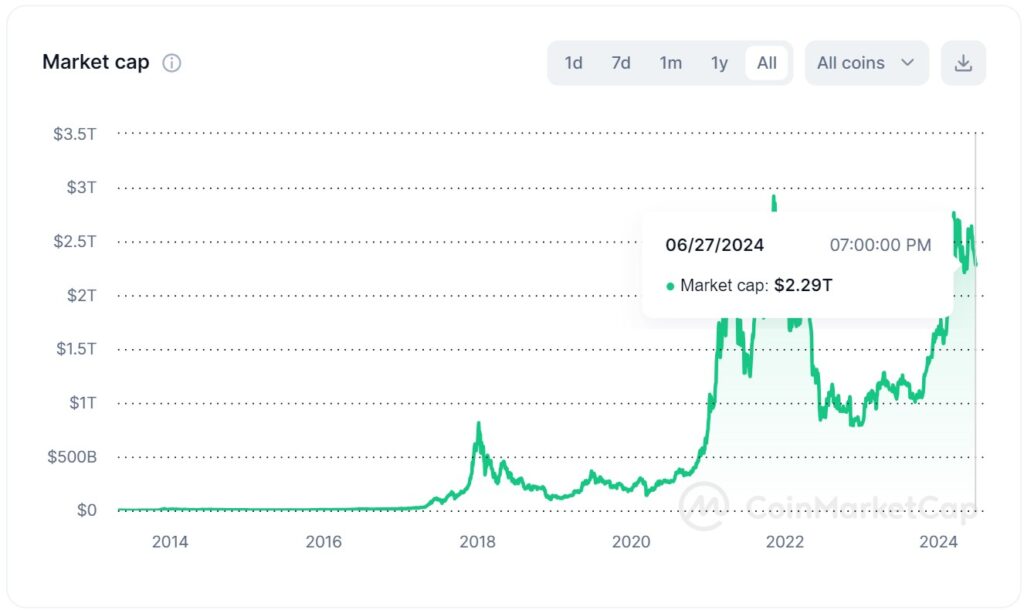First, standard disclaimer that this post is opinion and we are not licensed financial professionals, nor is anything meant to be taken as official financial advice. However, we have both direct and indirect experience with cryptocurrency and would like to share our opinions on some of the things we have observed.
Anecdotally, this year we have seen an increase in cryptocurrency scams. Much of this began during and after the pandemic, when the crypto markets really went wild. And they haven’t calmed down much, as seen in the total crypto value chart below from Coin Market Cap (https://coinmarketcap.com/charts/). There are trillions of US Dollars to be had in the crypto world! How exciting!

But due to this excitement and vastly increased awareness of the existence of crypto in the mainstream media, bad actors have been taking advantage of unsuspecting individuals in several scams. Regular financial markets are confusing enough, and the crypto world can seem like the lawless Wild West in comparison.
Here are our thoughts on what to watch out for, what to do if you are interested in crypto, and some options if you run into trouble.
- If anyone tells you that they can get you any percent or amount of guaranteed gains, run! This is very likely to be a variation of a Ponzi Scheme a la Bernie Madoff, where each subsequent investors’ funds are used to finance previous “gains” until the whole thing collapses. Additionally, the crypto market is still very new and speculative. And while the trend has been upwards, that’s no guarantee.
- We have personally encountered individuals that were communicating with bad actors who promised to help them invest in these confusing markets. They are directed to a crypto exchange, which is the part of the scam where their invested funds run into some type of problem with the money to never be seen again. Tens to hundreds of thousands of dollars have been lost this way.
- Making a cameo appearance is a variation of the classic phishing “Nigerian Prince” scam where you have made vast sums of gains, but to withdraw them you have to send in extra money to cover taxes or fees. Yes, gains made with crypto are subject to taxes just like stock market capital gains, but you should never need to send in extra money to cover them. They should work like stock exchanges where either taxes are withheld from your gains when cashing out, or where you are left to be responsible for paying (and yes, a legit exchange will share this info with the IRS. Uncle Sam always wants his cut, too).
So what are some things that you should do to avoid scams if you do want to invest?
- Research and ask trusted sources–ideally people you can meet in person and not a stranger over the internet).Be wary of individuals who only email from personal accounts or chat via WhatsApp or other similar applications.
- Use a legitimate exchange, like crypto.com or coinbase.com
- Don’t let someone create an exchange account for you. Treat it like a bank account login.
- Don’t invest more than you can afford to lose
- While the above exchanges are generally considered safe, large exchanges have failed before (Mt Gox and FTX, anyone?).It may be a good idea to store any crypto you won’t be regularly trading on a “cold storage” hardware wallet. This can be something such as a hard drive or dedicated storage device. An extra benefit of this is that if you forget the password or the drive fails, we would have a better chance of helping to recover the funds for you.
Finally, if you were scammed, or think you were, don’t feel ashamed. Document everything you can and either come talk to experts like us or report it to the FBI Internet Crime Complaint Center at https://www.ic3.gov/. And communicate your issues as soon as possible. If you want to follow the reported scams here is one more link: https://dfpi.ca.gov/crypto-scams/.
Stay safe, and hopefully make it to the moon!

dogecoin cartoon




Recent Comments